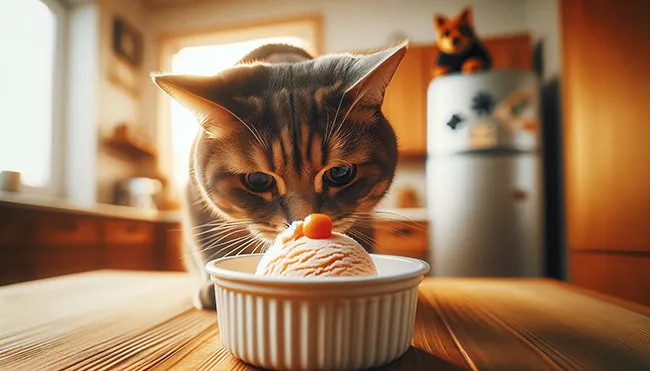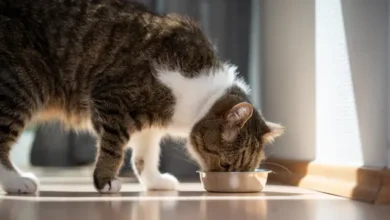Can Cats Eat Dog Ice Cream?

Can cats eat dog ice cream? Yes, cats can technically eat dog ice cream in small amounts as an occasional treat, but there are several important considerations to keep in mind. Dog ice cream is generally made to be pet-friendly, often lacking lactose, which makes it easier on pets’ digestive systems compared to regular ice cream. However, not all dog ice creams are created equal, and some may contain ingredients that are not suitable or beneficial for cats. Here’s a breakdown of key points to consider:
- Ingredients: Always check the ingredients list for anything potentially harmful to cats. Avoid products containing xylitol, chocolate, caffeine, grapes, raisins, excessive dairy (if not lactose-free), onions, garlic, high carbohydrate content, artificial colors, flavors, and excessive fat.
- Nutritional Needs: Cats have different nutritional needs than dogs. Feeding your cat dog ice cream regularly could lead to an unbalanced diet, lacking in essential nutrients specific to cats.
- Lactose Intolerance: Most cats are lactose intolerant. While dog ice cream is usually lactose-free, it’s important to confirm this to avoid digestive issues.
- Portion Control: Treats should constitute no more than 10% of your cat’s daily caloric intake to prevent obesity and related health problems.
Do Cats Like to Eat Dog Ice Cream?
Cats might show interest in dog ice cream due to its creamy texture and coolness, particularly on a hot day. However, dog ice cream is formulated with dogs in mind, not cats, and often contains ingredients that don’t cater to the nutritional needs of cats. While the occasional small taste may not harm your cat, it’s not an ideal treat due to potential lactose intolerance in adult cats and the possibility of unsuitable or even harmful ingredients for cats. Regular ice cream, whether for dogs or humans, shouldn’t replace snacks designed specifically for felines, which meet their dietary requirements. If you’re looking to treat your cat, it’s best to opt for products made with cats in mind or consult your vet for safe, homemade alternatives. This ensures your cat enjoys their treat without risking their health.
Potential Health Risks for Cats Indulging in Dog Ice Cream
If a cat eats dog ice cream, several types of problems can arise, depending on the ingredients of the ice cream and the individual cat’s health and dietary sensitivities. Here are some potential issues:
- Digestive Upset: Many cats are lactose intolerant, meaning they have difficulty processing lactose, which is found in many dairy products. While some dog ice creams may be lactose-free, others that contain dairy can cause symptoms such as diarrhea, vomiting, and stomach discomfort in cats.
- Toxic Ingredients: Some dog ice creams may contain ingredients that are harmful to cats. For example, xylitol, a sugar substitute found in some sugar-free foods, is highly toxic to dogs and can also be dangerous for cats, leading to low blood sugar and liver failure.
- Nutritional Imbalance: Dog ice cream is formulated for dogs, not cats, and does not meet the specific nutritional needs of cats. Cats are obligate carnivores and require a diet high in protein from animal sources. Regularly consuming foods that are not specifically designed for cats can lead to nutritional deficiencies or imbalances.
- Allergic Reactions: Just like people, cats can have allergies to certain foods. Ingredients in dog ice cream could trigger allergic reactions in some cats, leading to symptoms like itching, swelling, or gastrointestinal issues.
- Weight Gain and Obesity: Treats, including dog ice cream, can be high in calories. Feeding your cat high-calorie treats on a regular basis can contribute to weight gain and obesity, which in turn can lead to other health issues such as diabetes, heart disease, and joint problems.
To ensure your cat’s health and well-being, it’s best to stick to treats and foods specifically designed for cats, especially those that are approved by your veterinarian. If you want to give your cat a special treat, consider making homemade treats with safe, cat-friendly ingredients or purchasing cat-specific ice cream alternatives that are formulated to meet their dietary needs.
Conclusion
In conclusion, while an occasional lick of dog ice cream is unlikely to harm your cat, it’s not the ideal treat due to the potential for unsuitable ingredients and the lack of nutritional benefits for felines. It’s generally better to choose treats specifically designed for cats, which cater to their dietary needs and minimize health risks. If you wish to give your cat a cool treat, consider making homemade frozen treats using cat-friendly ingredients or consult with your veterinarian for recommendations tailored to your cat’s health and dietary requirements. Read more: Can dogs eat it



